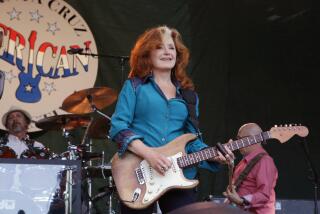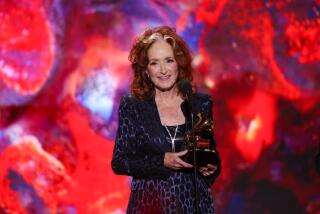POP MUSIC REVIEW : Raitt Brings Broadway to Hometown Fullerton Stage
- Share via
FULLERTON — John Raitt cuts an awfully robust father figure.
Pausing early in the solo benefit concert he sang Saturday night at Plummer Auditorium, the 73-year-old musical actor delighted in the newest of his many roles: beaming stage daddy of a Grammy-sweeping pop phenomenon.
“You see here a very proud father tonight,” Raitt, a Broadway veteran who grew up in Fullerton, said as he greeted the audience after his opening number. Watching daughter Bonnie pile up four awards at the Grammy ceremony last month was “one of the great experiences of my life. I’m a stoical Scotsman, but . . . it just blew me away, especially when the fourth one was over.”
What it all means, Raitt said, is that, like his own father before him, he’ll now be known mainly as “somebody’s father.” He sounded greatly pleased that the cycles of Raitt family history should have taken such a symmetrical turn.
Raitt’s concert, which benefited the YMCA of North Orange County and the Boys Club of Fullerton, was full of resonances--from his stage career, from his family past, and, not least, from the singer’s still-capacious voice box.
Raitt’s father, Arch, helped found the North County YMCA, and served as its director for 27 years (Raitt dedicated the benefit “to old Arch’s memory”). Plummer Auditorium was an especially apt site for the concert: Raitt, who now lives in Pacific Palisades, made his performing debut on the same stage 56 years ago with a small singing role in a community theater production.
Perhaps it was more than coincidence that one of the 21-song concert’s finest moments cast Raitt in the role of Cesar, the aged father from “Fanny,” expounding to his son about what is most important in life. “Love Is a Very Light Thing,” a tender song about the primacy of love for a child, and “Welcome Home,” a recounting of the joys of the hearth, stood out in Raitt’s 40-minute first act.
Near the end of the show, Raitt effectively re-created another fatherly role (or, more precisely, an expectant father’s role) as he sang “Soliloquy” from “Carousel,” wherein ne’er-do-well Billy Bigelow contemplates the changes and challenges that fatherhood will bring (the part of Billy was Raitt’s first starring role on Broadway, back in 1945, and it won him a best musical actor award from the New York Drama Critics).
Raitt’s baritone was impressive in two divergent ways. His singing was clear and sweet at the top of his range, which lent a special tenderness to the softer ballads in a program culled mainly from the Broadway vault of hits. He also excelled on the forceful sustained notes that climaxed many of his selections. With “Mary in the Morning,” Raitt mustered an especially affecting combination of sweetness and power.
Raitt was less successful with some of the deeper, more rapid narrative passages that some of his show tunes required. At least in the first half, which Raitt sang without a microphone, Sam Krieger’s piano accompaniment tended to roll over the singer during those quicker, lower bits. That difficulty ended after intermission when Raitt returned with a microphone, but another problem arose in its place: intermittent thuds and whooshes caused by Raitt’s singing or movement of the mike.
Some songs were under-dramatized, with Raitt adding little in the way of gesture or movement. Figaro’s Aria, from “The Barber of Seville,” was one selection that could have used a good deal more frenzy than Raitt gave it. On the other hand, he gave “I Am Free,” from “Zorba,” a spirited dramatization. (In May, Raitt is booked to play the lead in a Fullerton Civic Light Opera Co. production of “Zorba.”)
It was tempting, but not especially fruitful, to search Raitt’s concert for genetic coding. What in the father has been passed on to the daughter? John’s Broadway tradition and Bonnie’s blues and folk traditions have too little in common to judge. But the ability to convey deep tenderness one moment, then to reach back and hit with brassy force, is something that continues to serve both Raitt generations well.
More to Read
The biggest entertainment stories
Get our big stories about Hollywood, film, television, music, arts, culture and more right in your inbox as soon as they publish.
You may occasionally receive promotional content from the Los Angeles Times.










